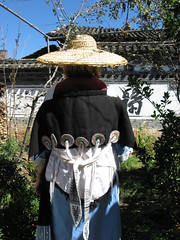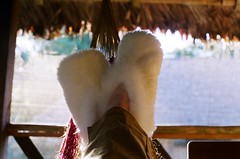I rented a bike for the trip to Baisha, a village known for its frescoes and its Taoist doctor. Before I even found my way out of Lijiang I managed to crash the bike; a car had pulled out in front of me in the bike lane and I thought I could make it up on to the curb, but didn't. I did a decent roll, and came away with a small cut on my elbow, one on my shin, and a few impressive bruises.
I passed through the new town, as well as a few nice Naxi villages, on the way to Baisha. The weather was great for biking, but some of the cobblestone streets rattled my teeth. Between the villages were fields of tall, yellowed corn stalks; some of the villagers were harvesting them. I could see the corn piled in the second stories of some of their homes.
The houses themselves were built of red brick or cinder blocks, topped by grey tile roofs with turned-up eaves. Most were fronted with nice archways leading into courtyards.
I found the tour bus parking lot for Baisha first, and gratefully abandoned the bike in the designated area. I paid the entrance fee and saw the home of a long-gone important person, complete with a small Taoist temple and frescoes that seemed to have been imported from someplace else. I think they were from the Tang dynasty, and they looked their age. As at one other Taoist temple I'd visited, I was mainly struck by the similarities between these and medieval Christian art: the halos, the faded, orangey tinge, and the formal seated poses of the subjects.
Leaving out the back way, I followed the trail of souvenir stalls to the center of the village. There were plenty of framed newspaper clips from all over the world outside the office of the Taoist doctor, but the man himself did not seem to be in. I reflected that tour-group hordes and free-thinking wielders of Lonely Planet like myself didn't seem to have done Baisha much good.
I kept walking. The touristy and non-touristy parts of the village were conveniently separated by an archway. In front of the archway an old, tiny woman approached me and showed me a guestbook with pages filled with testimonials from all over the world, as well as a few pictures of herself with Western women dressed as Naxi. I wasn't sure exactly what she wanted, but from the testimonials it seemed that she intended to have me for tea in her garden and dress me up for photos. Given the fact that we couldn't communicate, this promised to be an awkward experience. Also, I didn't know whether she'd expect money.
Fortunately a young Han couple wearing yellow Northface jackets had stopped to watch the proceedings, and the woman asked in English if she could help. We three tourists ended up following the old woman to her courtyard, where indeed she gave us tea and nuts and dressed the women up like Naxi, after which we took numerous pictures in various parts of the courtyard.
The young woman was from Shanghai and spoke English as well as any Chinese I'd met in the country. her significant other was from Xi'an and didn't talk much, though he seemed to understand English perfectly. The young woman called our hostess nainai--grandmother--and told me that her "local Chinese" was difficult to understand.
After the photo session we signed the guestbook and took down the old woman's address so that we could send her postcards, and left. On the way out the woman from Shanghai asked the old woman about money, and gave her 20 yuan. I started to get out my money, but the young woman shook her head. She had translated for me that the old woman's husband was dead, and that her children lived elsewhere. Perhaps playing host for tourists was for her some combination of a hobby and a way to get by.
At the main road the young couple headed south on their bikes, and I went back into the touristy part of the village to explore a little more and get lunch. I bought a large batik rectangle of cloth, a wedding gift for some friends, and a couple of tiny oval boxes that the saleswoman said were made of yak bone. Then it was back to the bike.
I'd picked up a better map in the cafe where I'd lunched, and decided to head south to Shuhe village. The woman from Shanghai had told me that she was staying there, and that in her opinion it was better than Lijiang. It was, as I suspected, the same village that Mr. He had delivered me to, but this time I had time to explore. The tourist takeover of the village seemed even more complete than in Lijiang, and I didn't stay long. I bought another batik cloth, this one for my own futon, and paid less than half what the first one had cost, even without haggling. Ah well.
It was hard to stuff everything in my bicycle basket, but I managed it. I turned in the bike in Lijiang, had a snack at a cafe on the grass-selling square, checked email, collected my bag, and got to the airport hours before my 10:45 flight.
The receptionist at the hostel had booked me a complicated arrangement that involved flying to Chengdu, using a voucher for a hotel, and flying to Hangzhou first thing in the morning. This sort of thing seemed to be common, and there are companies that pick you up at the airport and take you to the hotel. In theory, anyway.
In reality, I collected my bag and went over to a man who was holding a sign; people were collecting around him. He was with an airport-hotel company, but not my airport-hotel company. In an amazing stroke of luck, another man reached the sign-man just before me and asked the same question. he turned out to be a fluent English-speaker (originally from Hong Kong), and explained that our company wasn't there, but that we could walk to the hotel in five minutes. Which we did.
We arrived after midnight, but the entrance area was full of people, and all of them seemed to be hoping to check in. Most were clutching vouchers. The man from Hong Kong finally made his way up to the counter. All I could catch was some discussion of whether he was one person or two people (because of me, presumably), and the word "foreigner." An argument broke out between the receptionist and the line of men at the counter, with one of them using that word I'd learned a few days before, "judge." Was he threatening legal action? Finally the man from Hong Kong explained to me, somewhat unnecessarily, that there weren't enough rooms.
Soon afterward, a woman procured a key card and asked me whether I'd like to share. This seemed like my best chance of getting to sleep anytime soon, so I followed her up to the room. She explained that she was studying English and had asked to share a room with me. But we didn't talk much, apart from a brief discussion of how to conjugate "to choose."
Subscribe to:
Post Comments (Atom)


2 comments:
What an adventure - there's more info about Lijiang and Baisha and the good Dr Ho at http://www.travelpod.com/members/happysheep
In case you get in a similar situation this should cove it ;)
http://conjugator.reverso.net/conjugation-english-verb-choose.html
Post a Comment